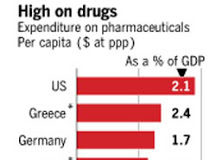See Corrections and Amplification below.
“We get no respect,” said a Pfizer representative, “no respect at all I tell you! Last week we ran an ED help-seeking ad that did not mention Viagra and we’re very active in providing and working with different groups to create materials to emphasize safe sex. Yet the AIDS Healthcare Foundation says it is outraged that we would employ an advertising strategy that encourages the use of Viagra as a ‘party drug.'”
Some time ago I sort of made fun of Pfizer CEO Henry McKinnell who lamented that the drug industry gets no respect (see “Can’t Get Any Respect!“). McKinnell, of course, was talking about respect from consumers whose heart attacks, strokes, and cancer were “cured” (according to McKinnell) by the drug industry.
And even though Pfizer has made some admirable changes to its direct-to-consumer advertising, it still seems to get no respect; AIDS Healthcare Foundation “outrage” being a case in point. [BTW, the quote at the top — except for the bold text portion about safe sex — was not made by any Pfizer representative that I know of. It’s just an artistic license we bloggers like to use.]
Pfizer is the Rodney Dangerfield of the pharmaceutical industry!
Now you know that I am no fan of ED drug DTC. Laura Landro, health reporter for the Wall Street Journal, got the message. She said, in an article about blogs, “among [Mack’s] pet peeves is erectile-dysfunction advertising, which he believes focuses too heavily on younger men and libido-enhancing promises while failing to educate consumers about the disease.”
It’s true. That’s why I was pleasantly surprised when I recently saw Pfizer’s new non-branded TV ad about erectile dysfunction. I heard that Pfizer would be doing this back in November, 2005 (see, for example, Pfizer Tries Unbranded ED DTC Ads), but I did not see it until a few days ago.
Not only did I see it, but I learned something about ED (erectile dysfunction) from it. And it made me think that I better know more because the ad pointed out that ED could be related to high cholesterol, high blood pressure, and diabetes. I knew about the diabetes and high blood pressure connections, but didn’t think high cholesterol was a factor. I’m no smarter than the average guy, so I figure that message also got through to many other men.
I also note that GSK, marketer of Levitra in the US, ran a similar ad directing viewers to a web site and 800 number.
So, my hat’s off to Pfizer for doing a good job, at least in the TV ad.
The AIDS Healthcare Foundation’s concerns, mentioned at the beginning of this post, were focused on full-page print ads for Viagra that played up the sexual promiscuity angle:
The full-page ad in question ran in The Wall Street Journal and features the same middle-aged man Pfizer has used in most Viagra ads. Two pieces of the text read, “What are you doing on New Year’s Eve?” and “Fact: Viagra can help guys with all degrees of erectile dysfunction — from mild to severe.” [AdWeek: AIDS FOUNDATION BLASTS VIAGRA ADS. Characterizes Pfizer as ‘Reckless’ and ‘Irresponsible’]
I haven’t seen this ad. It may be irresponsible, but “reckless?” No respect I tell you, no respect at all!
Corrections and Amplications
I mistakenly attributed learning about diseases or medical conditions that are associated with ED to a Pfizer non(un)-branded ad. I actually learned about these associations via GSK’s non-branded ad in which cartoon characters are used. This ad directs viewers to a web site where you can get more information.It’s interesting that I got confused and attributed a groundbreaking ad to Viagra. This is an example of the oft-repeated criticism of non-branded ads; i.e., they tend to benefit the category leader (Viagra in this case) the most. Pharma companies are aware of this, but often they base their lack of interest in non-branded ads on the opinion that they are not as effective as branded ads in getting people to take action (see, for example, “Why unbranded ads don’t work“).
The action ED marketers seem to want to happen now is for men (and women) to start talking about ED and the campaigns by Pfizer and GSK are very similar in that respect. This is another reason I got confused: Pfizer did run a non-branded DTC TV ad and it’s campaign has the tagline “Make the Call,” which is very similar to GSK/Bayer’s new campaign tagline, which is “Strike Up a Conversation”.
I am happy to contribute to the new ED chatter!









![6 Digital Tools at the Center of Healthcare Digitalization [INFOGRAPHIC]](http://ec2-54-175-84-28.compute-1.amazonaws.com/pharma-mkting.com/wp-content/uploads/2021/04/6DigitalTools_600px-100x70.jpg)




